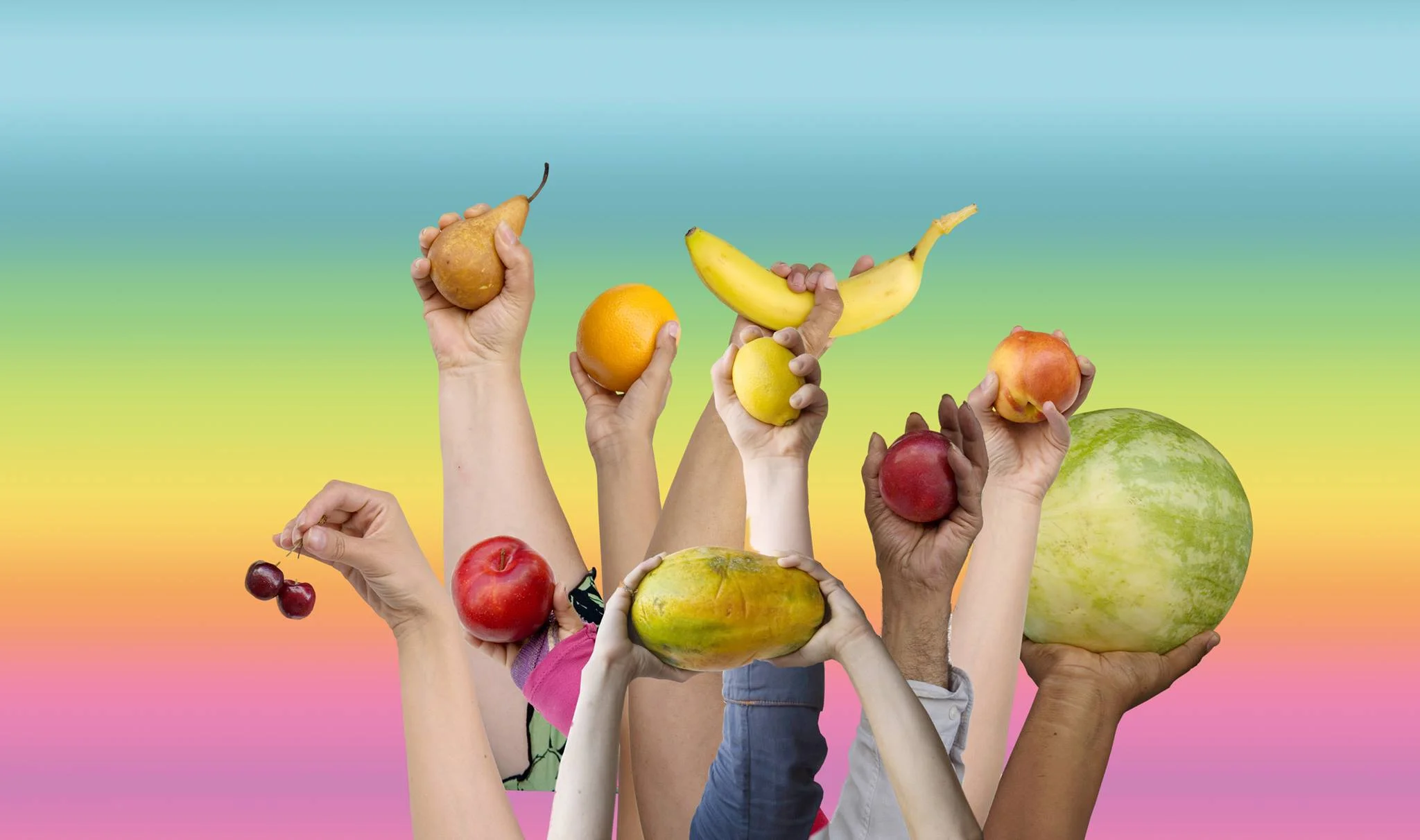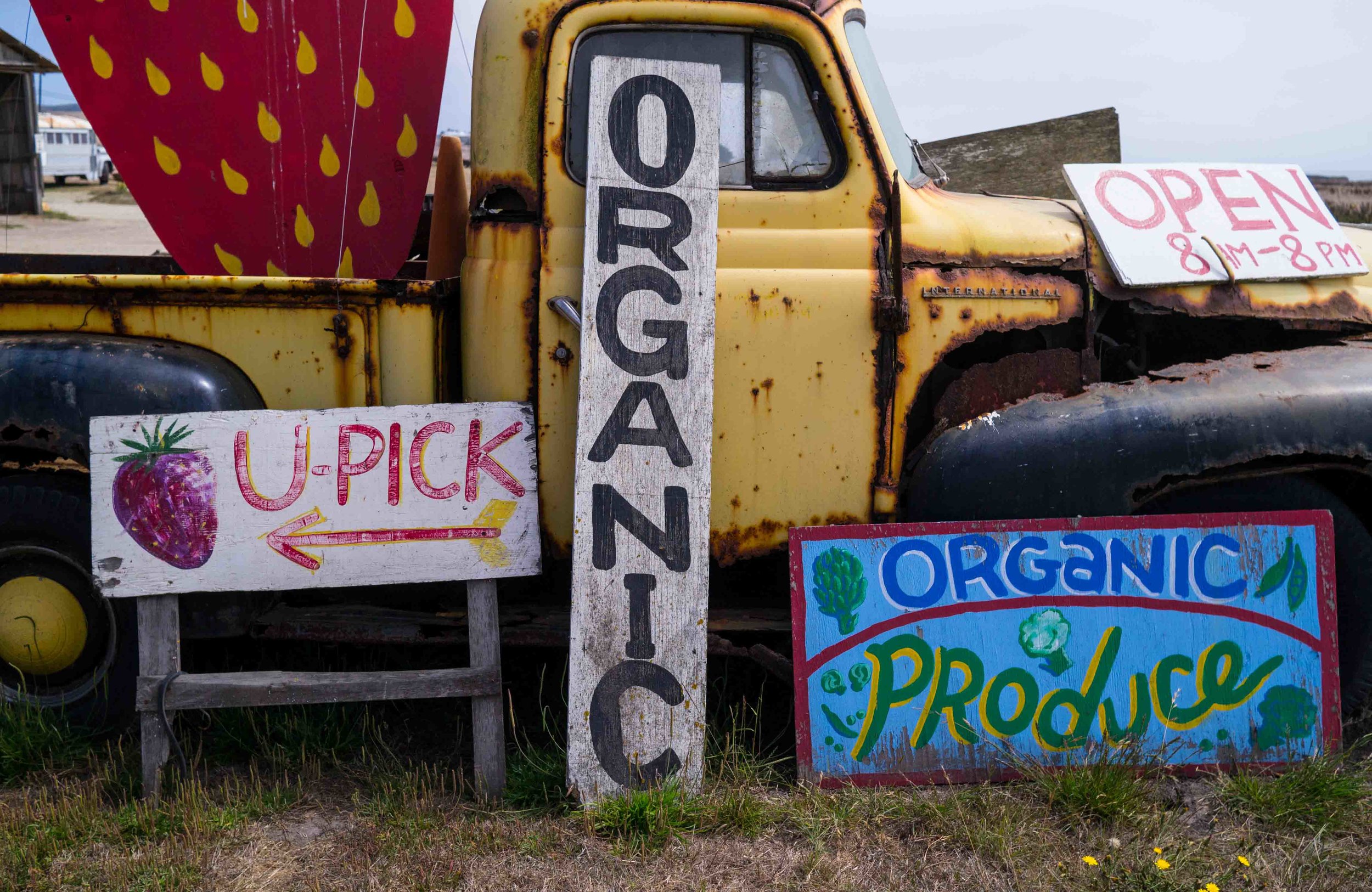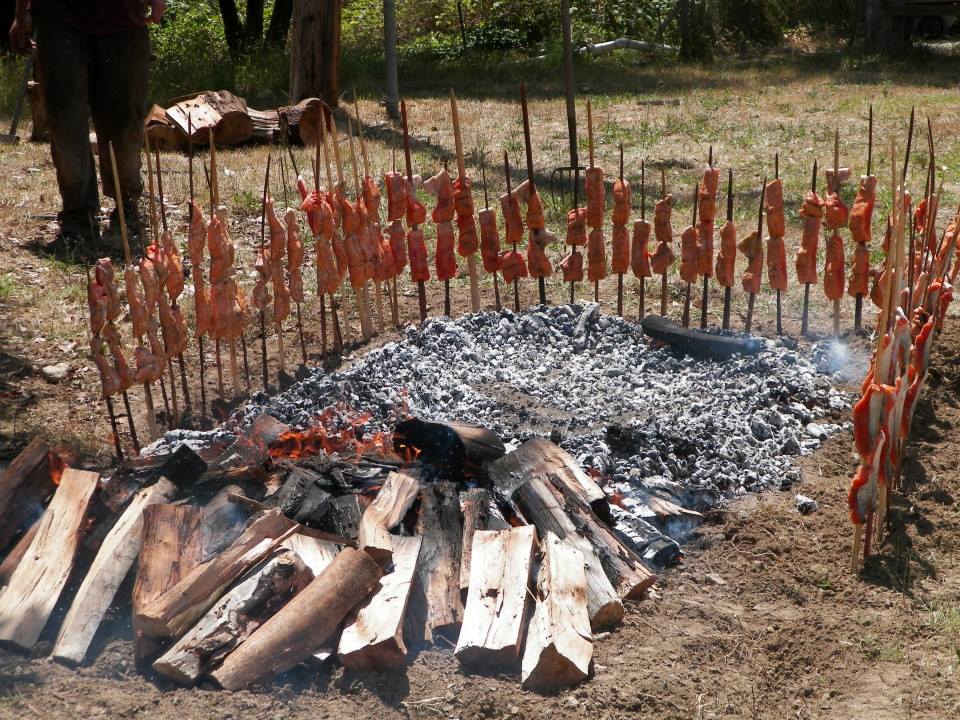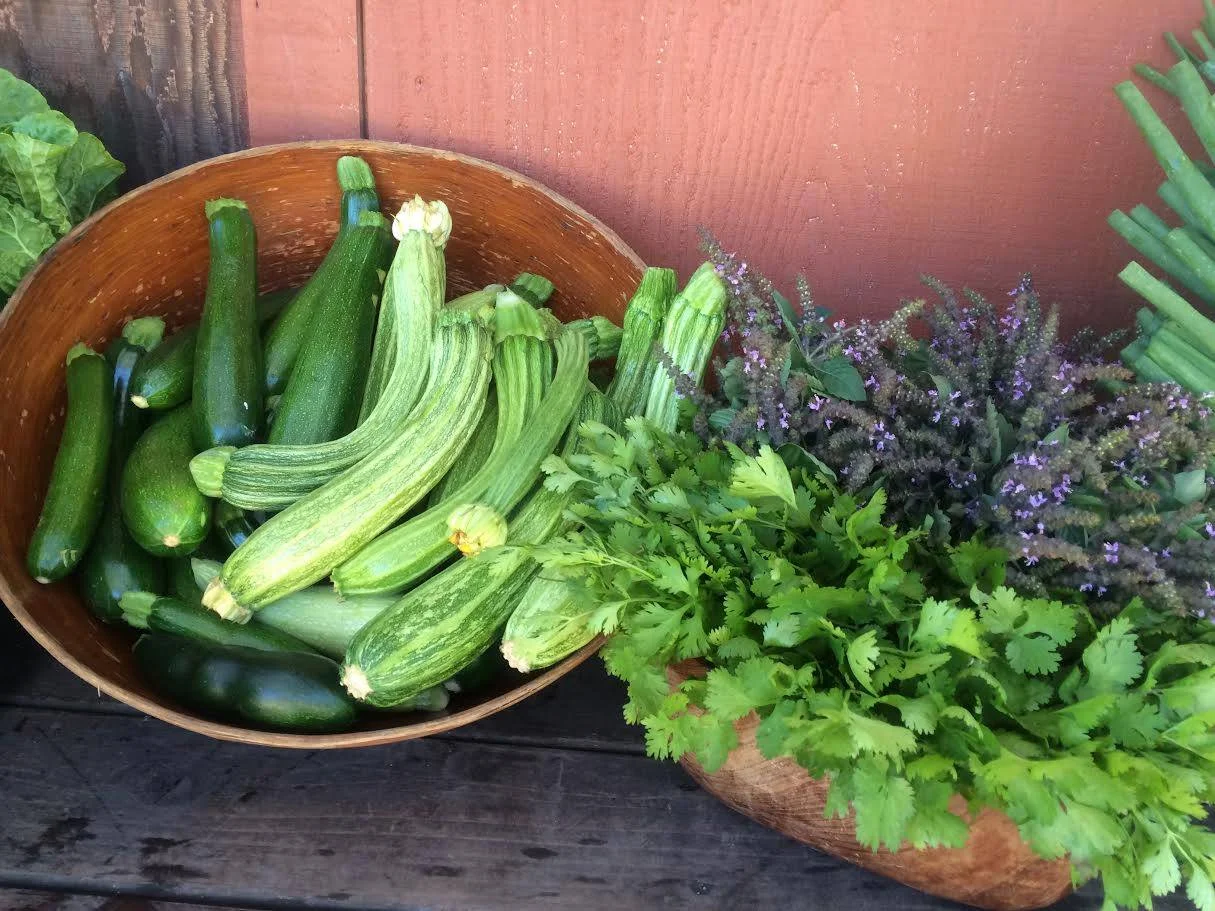Jezra Thompson is the Program Supervisor of the Berkeley Public School Gardening & Cooking Program, where she leads a team of garden educators and works with schools and community organizations to provide hands-on, place-based education to all students. She is a food system planner who focuses on community development, land use planning, and education. Jezra has worked on healthy food access and education at DC Greens, the California Farmers Market Association, and the USDA’s Food and Nutrition Service, and she writes for Civil Eats. In this episode, Delicious Revolution intern Rebecca Murillo talks with Jezra about the ways school gardens and kitchens provide a unique learning environment and an opportunity for students to be their own leaders in the world.
34: Kristyn Leach of Namu Farm on finding roots and community through plants, adapting Korean vegetables to California, and figuring out farming without fossil fuels
Kristyn Leach runs Namu Farm at the Sunol AgPark east of the San Francisco Bay. She grows vegetables for San Francisco restaurant Namu Gaji and seeds for the Kitazawa Seed Company. Kristyn grows both traditional and whimsical produce, focusing on Korean varieties and using organic, biodynamic, and permaculture practices without any fossil fuels. She discovered the foods of her Korean heritage further on in her life, as she was adopted as an infant and grew up in New York, where she later became a part of the urban gardening movement. Her fascination with shiso led her back to her roots and connected her with her Korean roots. In this episode, Devon talks with Kristyn about finding roots and community through plants, adapting Korean vegetables to California, and figuring out farming without fossil fuels.
33: Fallen Fruit -Austin Young and David Burns on planting public fruit parks around the world, and fruit as an art medium and subject
32: Jim Cochran of Swanton Berry Farm on working with the United Farm Workers and growing organic when everyone says it’s impossible
31: Ron Reed of the Karuk Tribe on re-discovering traditional knowledge, uncomfortable collaborations, and renewing culture with sacred fire
DR Special #1: Kathleen, Trainee at the Homeless Garden Project
In this special episode of Delicious Revolution, Chelsea speaks with Kathleen, a trainee at the Homeless Garden Project, about her experience. This episode is a companion to episode #30, our interview with Darrie Ganzhorn, the director of the Homeless Garden Project.
30: Darrie Ganzhorn on the Homeless Garden Project and why an organic farm is a great place for people find the tools they need to build a home in the world
Darrie Ganzhorn is the executive director of the Homeless Garden Project, a 3-acre organic farm and garden in Santa Cruz, California where, as the mission statement reads, “people find the tools they need to build a home in the world.”
29: Lexa Walsh on meals that bring people together across difference, creating temporary utopias, and collecting recipes for food end everything
Lexa Walsh is a longtime artist and cultural worker based in the Bay Area. She has also lived, worked, exhibited and toured internationally. She founded the experimental music, performance and film venue the Heinz Afterworld Lounge, worked for many years as a curator and administrator at CESTA, an international art center in Czech republic, whose team created radical curatorial projects to foster cross-cultural understanding. She co-founded and conceived of the all women, all toy instrument ensemble Toychestra. She founded and organizes Oakland Stock, the Oakland branch of the Sunday Soup network micro-granting dinner series that supports artists’ projects, and launched the Librarification tumblr, which hosts artist resources. Her silo-busting project Meal Ticket brings people who don't normally eat with each other together for a meal. In this episode, Lexa talks to Chelsea about meals that bring people together across difference, creating temporary utopias, and collecting recipes for food end everything.
28: Jessica Prentice on making a worker-owned and community supported kitchen, and inviting people into their own kitchens with good ingredients
Jessica Prentice is a founder of Three Stone Hearth, a Community Supported Kitchen and worker-owned cooperative in Berkeley, California. She has loved cooking for as long as she can remember. In 1996 she completed the professional Chef’s Training at the Natural Gourmet Institute in New York. She worked as the Chef of the Headlands Center for the Arts in Marin from 1997-2001, where she founded the Headlands Hearth Bakery and Café in 2001. Jessica educated herself in sustainable agriculture issues, and in 2002 was hired as the first Director ofEducation Programs for the Ferry Plaza Farmers Market in San Francisco. Jessica coined the word “locavore” and co-created the Local Foods Wheels. She is the author of Full Moon Feast: Food and the Hunger for Connection. Recently, she has been writing about new and very old models of cooperative work. In this episode, Jessica talks with Chelsea about making a worker-owned and community supported kitchen, and inviting people into their own kitchens with good ingredients
27: Michaela Leslie-Rule on paying attention to culture in public health and nutrition, the complexity of food choices, and bridging the generational gap in food knowledge.
Michaela Leslie-Rule is a digital media producer, storyteller and social scientist. As the owner of Fact Memory Testimony she has been fortunate to collaborate with ITVS, Memphis Music Initiative, Community Foundation for Monterey County and Nike and Firelight Foundations’ Grassroots Girls Initiative. Embedded in Michaela’s approach to research, advocacy and communication is elevating constituent voices through the use of storytelling. She is particularly interested in participatory methods for measuring and documenting social and organizational change, and has designed and implemented participatory projects on four continents. She uses a story-centric approach to produce multimedia projects and advocacy campaigns. As the producer of IGNITE: Women Fueling Science and Technology, Global Fund for Women’s global advocacy campaign and multimedia project, she curated and oversaw the creation of five online storytelling galleries, designed and implemented an international girls’ hackathon and oversaw a coordinated advocacy effort between the Fund and UN Women demanding equal access to and control of technology for women and girls worldwide. In this episode, Michaela speaks with Chelsea about paying attention to culture in public health and nutrition, the complexity of healthy food choices, the bridging the generational gap in food knowledge.
26: Sita Bhaumik on the People’s Kitchen Collective, decolonizing foods and remedies, and magical ingredients that travel the world
Sita Kuratomi Bhaumik is an artist, writer, and educator who understands art as a strategy to connect personal and public histories. Her research focuses on decolonizing the hierarchy of the senses and impact of migration. Raised in Los Angeles and based in Oakland, she is Indian and Japanese Colombian American. Sita holds a B.A. in Studio Art from Scripps College, an M.F.A. in interdisciplinary art and an M.A. in Visual and Critical Studies from California College of the Arts. She is a founding member of the People's Kitchen Collective in Oakland, California along with Jocelyn Jackson and Saqib Keval. Together, they produce community meals that narrate our migration. The goal of The People's Kitchen is to not only fill our stomachs but also nourish our souls, feed our minds and fuel a movement. In this episode, Sita talks with Chelsea about the People’s Kitchen Collective, decolonizing foods and remedies, and magical ingredients that travel the world.
http://peopleskitchencollective.com/
http://blog.montalvoarts.org/blog/flavors-of-resilience-the-peoples-kitchen-collective
http://www.artpractical.com/review/the_other_senses/
http://hyphenmagazine.com/magazine/issue-17-family-spring-2009/spice-war
25: Anna Lappé on the connections between food systems and climate change, the myth that we need toxic chemicals to feed the world, and the growing influence of the food movement
Anna Lappé is a bestselling author and widely respected educator, known for her work as an expert on food systems and as a sustainable food advocate. She is the co-author or author of three books and the contributing author to ten others. Anna’s work has been translated internationally and featured in The New York Times, Gourmet, Oprah Magazine, among many other outlets. Named one of TIME magazine’s “eco” Who’s-Who, Anna is a founding principal of the Small Planet Institute and the Small Planet Fund with her mother, Frances Moore Lappé. She is also the founder and director of the Real Food Media Project, which uses creative movies, an online movie contest, a web-based action center, and grassroots events to grow the movement for sustainable food and farming. Her latest book, Diet for a Hot Planet: The Climate Crisis at the End of Your Fork and What You Can Do About It, was named by Booklist and Kirkus as one of the best environmental books of the year. Anna is also the co-author of Hope’s Edge, which chronicles doc ial movements fighting hunger around the world, and Grub: Ideas for an Urban Organic Kitchen, showcasing the ecological and social benefits of sustainable food with seasonal menus from chef Bryant Terry. In this episode, Anna speaks with Chelsea about the connections between food systems and climate change, debunking the myth that we need toxic chemicals to feed the world, and food movement’s growing influence in popular politics.
August 15
24: Saru Jayaraman on the struggle for pay and working conditions in restaurants, innovative collaborations in labor organizing, and why people who like good food should care about labor politics
Saru Jayaraman is the Co-Founder and Co-Director of the Restaurant Opportunities Centers United (ROC-United) and Director of the Food Labor Research Center at University of California, Berkeley. After 9/11, together with displaced World Trade Center workers, she co-founded ROC in New York, organizing restaurant workers to win workplace justice campaigns, conduct research and policy work, partner with responsible restaurants, and launch cooperatively-owned restaurants. ROC now has 10,000 members in 19 cities nationwide. The story of Saru and ROC is chronicled in the book The Accidental American. Saru is a graduate of Yale Law School and the Harvard Kennedy School of Government. She was profiled in the New York Times "Public Lives" section in 2005, and was named one of Crain's "40 Under 40" in 2008, 1010 WINS's "Newsmaker of the Year," and one of New York Magazine's "Influentials" of New York City. Saru co-edited The New Urban Immigrant Workforce, and wrote Behind the Kitchen Door, and, most recently, Forked: A New Standard for American Dining. In this episode, Saru talks with Chelsea about the struggle for pay and decent working conditions in restaurants, the ROC’s innovative collaborations in labor organizing, and the reasons people who like good food should care about labor politics.
23: Hillary Sardiñas on the incredible diversity of native pollinators, the threats they face, and how they contribute to our food system
Hillary Sardiñas is a pollination ecologist and naturalist. She has a PhD from UC Berkeley, where she studied the ability of small-scale on-farm native plant restorations to contribute to both wild bee conservation and farm viability through increased yields due to heightened crop pollination. Hillary blogs about current pollinator-related research, translating science into key points for the public. Hillary is the Pacific Coast Pollinator Specialist for the Xerces Society for Invertebrate Conservation, a non-profit dedicated to the protection of wildlife and their habitat. Hillary provides technical assistance to farmers incorporating pollinator habitat on their farms. She also conducts a variety of educational events throughout the West Coast. In this episode, Hillary talks to Chelsea about the incredible diversity of native pollinators, the threats they face, and how they contribute to our food system.
22: Simran Sethi on the biodiversity behind the flavors we love, democratizing taste, and how everyone can take back their own experience of food
Simran Sethi is a journalist and educator focused on food, sustainability and social change. Named the environmental “messenger” by Vanity Fair, a top 10 eco-hero of the planet by the U.K.’s Independent, and designated one of the top eight women saving the planet by Marie Claire, Simran is the author of Bread, Wine, Chocolate: The Slow Loss of Foods We Love, a beautiful, personal book about the story of changes in food and agriculture told through bread, wine, chocolate, coffee and beer. She is an associate at the University of Melbourne’s Sustainable Society Institute in Australia, a contributor for Orion Magazine and a recent visiting scholar at the Cocoa Research Centre in St. Augustine, Trinidad. In this episode of Delicious Revolution, Chelsea talks to Simran about the biodiversity behind the flavors we love, democratizing taste, and how everyone can take back their own expertise in food.
21: Heidi Hermann on the multiple livelihood strategies of a farmer and educator, and harvesting seaweed at the edge of the continent
Heidi Hermann started Strong Arm Farm in 2009, originally with a focus on vegetables, and now offering an ever-expanding selection of specialty crops, including wildcrafted seaweed from the Sonoma coast. Heidi is also a Sustainable Agriculture Instructor at Santa Rosa Junior College, at their renowned Shone Farm facility. She has an Ornamental Horticulture degree from Cal Poly University, with emphasis in pest management and nursery production, and a Master’s from Sonoma State University, where her thesis was on Experiential Agriculture Education. Running Strong Arm Farm is truly a ‘practice what you preach’ example. Heidi is a strong-armed woman producing an array of beautiful and nutrient-dense delectables. In this episode, Heidi talks to Chelsea about the multiple livelihood strategies of a farmer and educator, and harvesting seaweed under the full moon.
20: Jonah Raskin on the oyster wars, what nature is for, and the need for creativity in response to the California drought.
Jonah Raskin is a writer - a poet and journalist - with a love for food and the people who make it. Jonah is the author of fourteen books on subjects ranging from women in rock n roll, marijuana culture and politics, Jack London, Alan Ginsberg, and a personal exploration of the food and farming culture of Sonoma County called Field Days. One thread that connects these works is a loving, exuberant sense of place. His countless articles in the local press in Sonoma County, where we both live, very often profile the eccentric characters here, and quite often, these people are immersed in lifetime projects of growing and making food. Jonah was raised on Long Island, got a PhD in England, and adopted Sonoma County in the late 1970s, where he taught literature and journalism at Sonoma State University. We met Jonah at a community meeting on oysters in West Marin County, California, and some of my favorite writing of his explores the bitter controversy over the closing of Drakes Bay Oyster Company. He is currently working on a book about the drought. In this episode, Devon and Jonah talk about the oyster wars, what nature is for, and the need for many kinds of creativity in response to the California drought.
19: Emma Rosenbush on shaking up labor politics in fine dining
Emma Rosenbush is the general manager at Cala in San Francisco, Chef Gabriela Cámara’s outpost of the renowned seafood restaurant Contramar in Mexico City. Before opening Cala, Emma stared an experimental pop-up restaurant in Mexico City called Pichón with Niki Nakazawa (who we interviewed on Delicious Revolution #9) and Kenny Curran. Prior to her time in Mexico, she worked at the Prison Law Office in Berkeley, where she decided that if she was ever responsible for hiring workers, she would hire former inmates. She is now leading the way in welcoming formerly incarcerated individuals into full-time, visible positions at Cala. Emma speaks with Chelsea about the changing labor politics in fine dining.
18: David Asher on raw milk, kefir cultures, and how diversity makes cheese and food systems resilient
David Asher is an organic farmer, farmstead cheese maker and cheese educator based on the gulf islands of British Columbia, Canada. A guerrilla cheesemaker, David does not make cheese according to standard industrial philosophies - he explores traditionally cultured, non-corporate methods of cheesemaking. David offers cheese outreach to communities near and far with the Black Sheep School of Cheesemaking. Through workshops in partnership with food-sovereignty-minded organizations, he shares his distinct cheesemaking style. His workshops teach a cheesemaking method that is natural, DIY, and well suited to the home kitchen or artisanal production. He is the author of The Art of Natural Cheesemaking. David talks with Devon about raw milk, kefir cultures, and how diversity makes cheese and food systems resilient.
17: Antonio Roman-Alcalá on coming out of DIY culture, pushing institutions, and transforming the food system at multiple scales
Antonio Roman-Alcalá is a food activist, gardener, teacher and scholar. In 2005, with a group of friends, he broke into a vacant lot by the freeway in the southern part of San Francisco to start Alemany Farm. He has taught Ecological Horticulture there and at many other food projects. He managed a food justice project and garden at San Francisco’s Potrero Hill public housing and organized the San Francisco Urban Agriculture Alliance. He made a movie called In Search of Good Food, and worked on forming the California Food Policy Council. He was part of Occupy the Farm. He recently got a masters degree at the Institute for Social Studies at the Hague for research on Food Sovereignty. His current project is a book called entitled An antidogmatist's guide to food systems, and how to change them. He will be writing the book blog post by blog post, and you can read it as Antonio writes it at antidogmatist.com -- starting soon in the spring of 2016. He is a musician and new father, and lives in San Francisco with his family. Antonio talks with Chelsea about coming out of DIY culture, pushing institutions, and transforming the food system at multiple scales.




